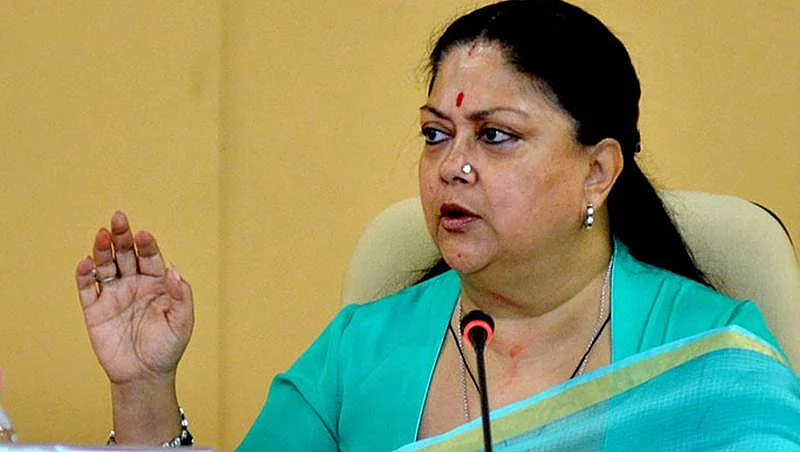The assessment of elections depends on two factors: personal or anecdotal evidence and media or academic narratives. The first has its obvious limitations since it is physically impossible to cover even a single state in its entirety, never mind the country. Personal assessments can at best be extremely patchy. This means that a collation of media accounts is the only means of coming to terms with the logic of any electoral decision.
In the past month, the reports from Rajasthan invariably speak of a recurrent theme running through all the regions: the alleged arrogance of Chief Minister Vasundhara Raje. It is said that this is weighing down the BJP campaign and negating some of the undeniable achievements of her administration.
Of course, the supposed personal imperfections of Vasundhara isn’t the only factor. Reports speak of the alienation of Jat and Rajput communities—both of which were supportive in 2013—from the BJP. This corresponds with the larger disquiet of the ‘dominant farmer communities’ such as Marathas in Maharashtra, Jats in western Uttar Pradesh and Patidars in Gujarat from any ruling dispensation. This has got to do with those groups sensing an erosion of political power and lack of government jobs owing to reservations. It is doubtful if any political party can satisfactorily resolve this issue.
However, the question of personal style is a different matter altogether. I have often been quite baffled over how impressions—and there is no doubt that these impressions are real—are formed. How and why does the apparent aloofness of a leader become a liability? Equally why and how does this become, at times, an advantage?
The questions are relevant for an obvious reason. Most voters have no direct contact with a minister or chief minister. They also don’t expect to be in direct contact and it is rare for an ordinary individual to go knocking at a chief minister’s door seeking the redressal of a grievance. It is more likely that their contact will be with either the local administration or the local MLA or even MP. Why should the vote of a voter in the districts be swayed by whether Vasundhara Raje has been standoffish with some BJP karyakarta or an RSS functionary?
The matter becomes more intriguing because supposed inaccessibility is often not inimical to political appeal. In Odisha, to take an example, Naveen Patnaik has been governing uninterruptedly since 1999 and winning election after election. Although there are often reports of anti-incumbency, it has not manifested itself in any significant way. At the same time, despite having lived uninterruptedly in Bhubaneshwar—a quintessential small town—for the past 19 years, Patnaik remains very much an outsider. He is an understated, private person who often appears detached from the routine humdrum of politics. By a conventional you may even say that he is inaccessible—the accusation now being hurled at Vasundhara Raje.
However, this aloofness of Patnaik hasn’t affected him politically. The political class may grumble that their chief minister is not given to the bonhomie one associates with say, Mamata Banerjee in West Bengal. But it is the public adulation of him which allows him to remain an outsider and still be a remarkably successful politician.
Ironically, I used to find the same complaint of aloofness levelled at Narendra Modi when he was chief minister of Gujarat. During the 2007 election, the standard assessment of those who used to hang around the BJP office in Ahmedabad was that the BJP would cross the majority mask, but only by a whisker. It was said that the top brass of the Gujarat RSS, too, was very unhappy with him and wouldn’t help out in the campaign. Yet, the public connect of Modi was spectacular. And it was this public connect that gave him his political authority. That trend persists to this day.
There is no template governing the most appropriate conduct of a politician. What seems a very successful style for Modi—the ability to rise above daily concerns—could, under different circumstances, become a liability. Rahul Gandhi, at one time, lost the Congress the services of an important politician in Assam because he was seen to be attending to his pet dog rather than listening to the state leader’s concerns. If Mamata, for example, was somehow to shed her deep involvement in everything from the management of procession routes to dictating her party’s daily strategy in Parliament, she would be a very different politician. In any case, that she is over-involved has not been to her disadvantage.
Still, the question as to how the impression that Vasundhara Raje is ‘arrogant’ and ‘inaccessible’ gained so much public currency is worth a thought. It just can’t be that she is inaccessible because she still commands the loyalty of many important local leaders, as was demonstrated when the BJP leadership tried to oust her as Leader of Opposition in 2009. Even now, from all accounts, she has managed to get her loyalists tickets and the public response to her rallies hasn’t been discouraging.
Yet, nearly every media report I have read talks about how the anti-incumbency has personalised against her. No one seems to have explained what has brought this about if indeed the dislike for her is that widespread among ordinary voters. Now, there is even talk of a ‘late swing’ in favour of the BJP—a theory I instinctively discount because people tend to make up their minds before the campaign starts, unless something dramatic intervenes.
Whatever the reality, we will know on December 11. However, even the outcome won’t solve the mystery of how and why this impression entered the popular discourse.
swapan Dasgupta is a senior journalist and Member of Parliament, being a presidential nominee to the Rajya Sabha.






